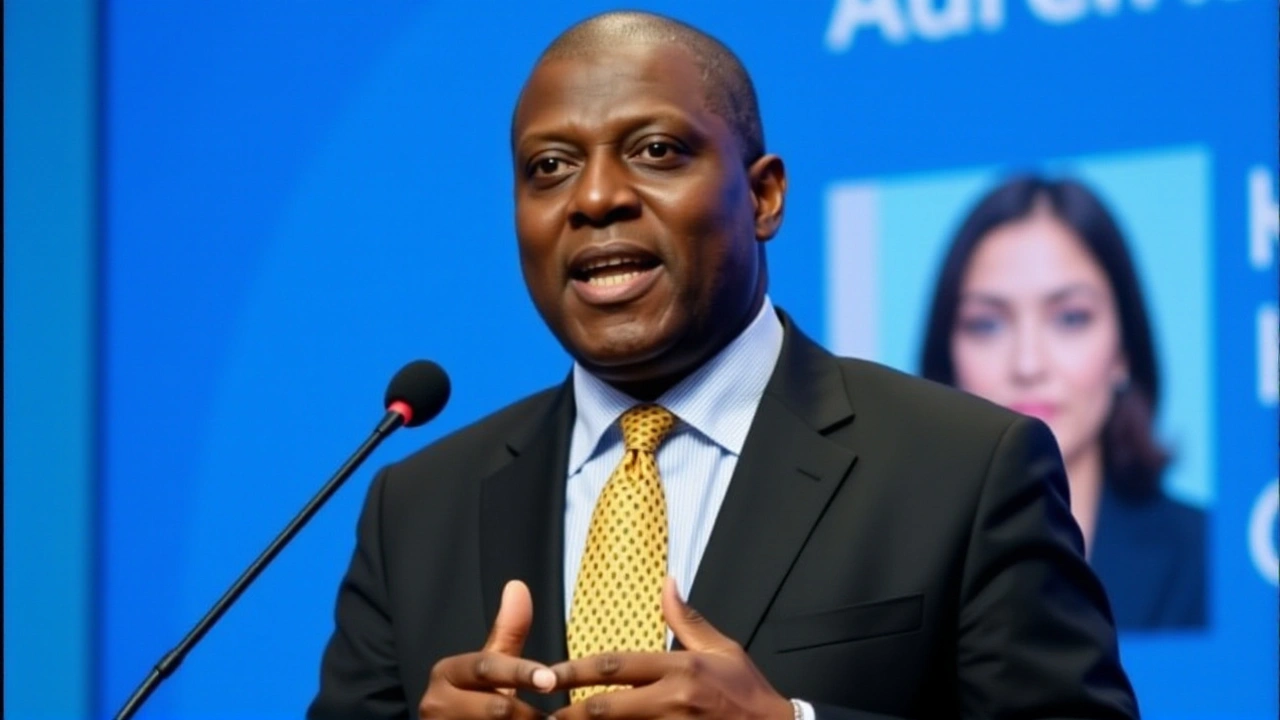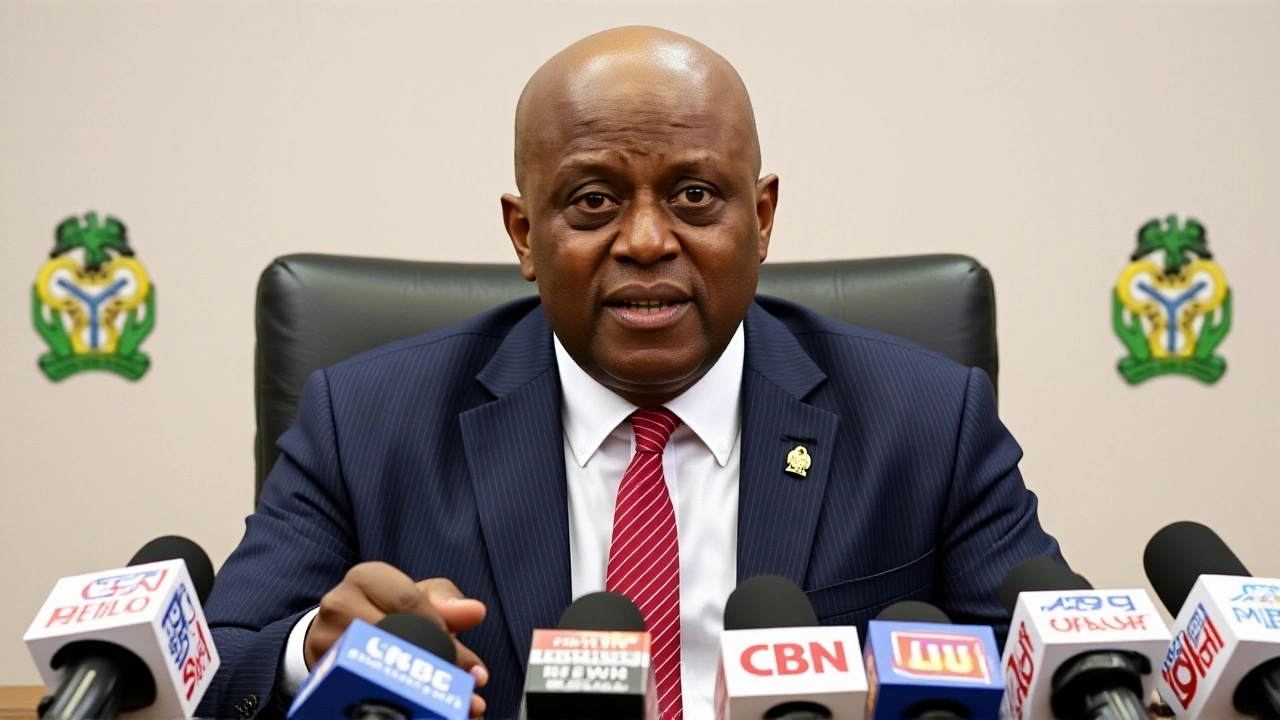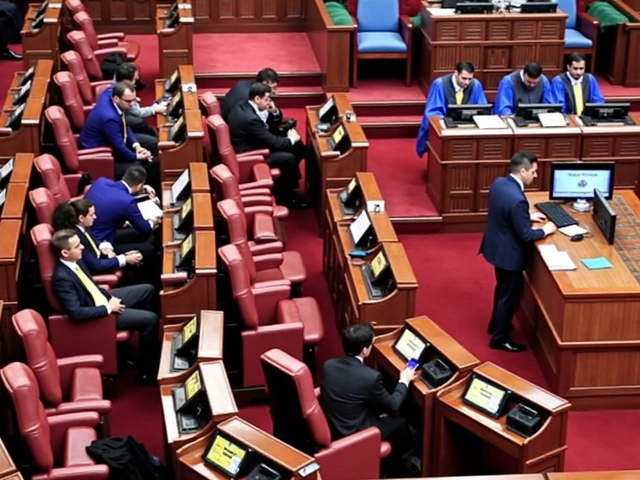When Olayemi Cardoso steps onto the stage at Lagos Business School this Friday, October 3, 2025, he won’t just be giving a speech — he’ll be launching a three-year experiment in public trust. The inaugural lecture of the CBN Governor's Annual Lecture SeriesLagos Business School, titled ‘Next Generation Leadership in Monetary Policy and Nation Building’, is more than ceremonial. It’s a direct response to the disconnect between Nigeria’s central bank and the millions of citizens struggling with 33.7% inflation — the highest in over two decades. Cardoso, the 21st Governor of the Central Bank of Nigeria, isn’t just trying to explain policy. He’s trying to rebuild credibility, one lecture at a time.
Why This Lecture Series Matters
The Central Bank of Nigeria has long operated like a fortress. Its decisions — interest rate hikes, currency controls, forex interventions — ripple through every corner of the economy. But for most Nigerians, these moves feel abstract, even arbitrary. The 2024 Financial Stability Report admitted it: public understanding of monetary policy is dangerously low. People see prices rise. They hear about rate changes. But they don’t connect the dots. That’s the gap Cardoso wants to close.
"Nigeria is at a pivotal moment, where technology, global financial realignments, and the energy of its youthful population are reshaping its economic future," Cardoso said in a statement earlier this year, quoted across multiple outlets. That line isn’t just rhetoric. It’s a roadmap. He’s betting that if Nigerians — especially students, academics, and young professionals — understand how the central bank works, they’ll become allies, not critics.
The Venue, The Audience, The Stakes
The choice of Lagos Business School is deliberate. Founded in 1991 and nestled along the Lekki-Epe Expressway, it’s not just a school — it’s a nerve center for Nigeria’s business elite. The audience won’t just be students. Senior officials from the federal government, CEOs of commercial banks, economists from universities across the six geopolitical zones, and even fintech founders will be there. This isn’t a closed-door meeting. It’s a public signal: the CBN is opening its doors.
And the stakes? High. Since Cardoso took office in September 2023, the CBN has hiked the policy rate to 27.5%, slashed dollar access for importers, and cracked down on parallel market forex traders. The goal: bring inflation down. But without public buy-in, these policies risk fueling resentment. Remember 2016, when inflation hit 18.7%? Protests followed. People didn’t understand why their fuel prices jumped — or why the CBN didn’t just print more money. Cardoso knows history repeats itself if communication fails.
A Strategy Built on Transparency
This lecture series is the centerpiece of Cardoso’s Knowledge Acceleration and Thought Leadership Initiative — a phrase you won’t find in any previous CBN strategy. It’s new. It’s bold. And it’s personal. Unlike past governors who rarely spoke outside policy briefings, Cardoso has made public engagement a signature. He’s done town halls. He’s appeared on local radio. Now, he’s institutionalizing it.
The plan? Four lectures a year through 2028, each hosted by a different Nigerian university — from the University of Ibadan to Ahmadu Bello University, from the University of Nigeria, Nsukka, to the University of Calabar. Each will tackle a different theme: inflation targeting, digital currency, financial inclusion, and the role of youth in economic transformation. No fees. No registration limits. Just open access.
"The Bank’s core mandate, safeguarding price stability, is essential to driving sustainable economic growth and protecting livelihoods," Cardoso told African Business Travel. That’s not just a quote — it’s the mission statement. He’s not asking Nigerians to trust him. He’s asking them to understand him.

What’s at Risk — and What Could Change
Here’s the twist: Nigeria’s economy is not just struggling with inflation. It’s struggling with *perception*. Investors hesitate. Consumers cut back. Businesses delay hiring. All because confidence is broken. Cardoso’s lecture series doesn’t fix the economy overnight. But it might fix the story around it.
If successful, this could become a model for other African central banks. Imagine Ghana’s Bank of Ghana or Kenya’s Central Bank hosting similar series. But if it flops — if lectures are poorly attended, if the content feels too academic, if people still don’t see the link between interest rates and their bread prices — then the CBN risks looking out of touch. Again.
Cardoso’s team has made one critical move: they’ve branded it #CBNNextGenLeaders. Not "CBN Talks" or "Monetary Policy Insights." NextGen. That’s the hook. This isn’t for old men in suits. It’s for the 60% of Nigerians under 25. It’s for the student who just opened a mobile wallet. The young entrepreneur who needs a loan. The mother who watches prices climb every week.
What Comes Next
The next three years will be a test. Will universities compete to host the next lecture? Will social media buzz around each event? Will the CBN release summaries in simple Yoruba, Hausa, and Igbo? Will they partner with radio stations to broadcast key excerpts?
Right now, the details beyond October 3 are still unclear. But the intent? Crystal clear. Cardoso isn’t just managing money. He’s trying to rebuild a relationship — between an institution and the people it serves.
Frequently Asked Questions
How will this lecture series affect everyday Nigerians?
If successful, the lecture series will help Nigerians understand why prices rise or fall, how interest rates impact loans and savings, and why the CBN can’t just "print money" to solve inflation. This knowledge empowers consumers to make better financial decisions and hold policymakers accountable. For example, understanding that a 27.5% policy rate is meant to cool spending — not punish borrowers — could reduce panic and misinformation.
Why is Lagos Business School the first host?
Lagos Business School is Nigeria’s most influential business school, with strong ties to the private sector, government, and international finance. Hosting the launch there signals credibility and reaches decision-makers directly. It’s also located in Lagos, Nigeria’s economic engine, where inflation impacts are most visible — from fuel prices to import costs — making it the ideal launchpad for nationwide dialogue.
What’s the link between inflation and this lecture series?
Nigeria’s inflation hit 33.7% in July 2025, eroding incomes and pushing millions into poverty. The CBN’s 2024 report found that poor public understanding of monetary policy weakens its effectiveness. If people don’t know why rates are raised, they blame the bank instead of adjusting behavior. This series aims to close that gap — turning confusion into clarity, and resistance into cooperation.
Is this just political theater?
It could be — but the timing suggests otherwise. Cardoso launched this just two years into his tenure, amid record inflation and growing public frustration. Past governors rarely engaged beyond press releases. The fact that this is a three-year, nationwide, institutionally backed initiative — not a one-off speech — signals a real strategic shift. It’s risky, but it’s also the most honest move the CBN has made in years.
Will this reduce inflation?
Not directly. Inflation is driven by supply chains, fuel subsidies, currency devaluation, and global oil prices. But public trust in policy matters. When people believe the CBN is acting transparently and with their interests in mind, they’re less likely to hoard goods or rush to buy dollars. That behavioral shift can ease pressure on markets — making monetary policy more effective, even if it doesn’t solve everything overnight.
What happens after 2028?
The CBN hasn’t said. But if the series gains traction — with universities clamoring to host, students asking sharp questions, and media covering each lecture — it could become a permanent institution. Think of it like the TED Talks of African economics: a platform where central banking meets public discourse. That’s the real legacy Cardoso is building — not just for his term, but for Nigeria’s next generation of economic leaders.







Posts Comments
sandeep singh November 19, 2025 AT 15:05
This is exactly the kind of weak performative politics Nigeria doesn’t need. The CBN’s policies are destroying livelihoods, and now they want to give TED Talks instead of fixing the root causes? Print money? No. But also stop pretending transparency will magically fix a system rigged by corruption and incompetence.
Sumit Garg November 21, 2025 AT 00:57
One must question the epistemological foundations of this initiative: Can monetary policy, a technocratic construct rooted in neoclassical economics, be meaningfully communicated to a populace whose economic literacy is systematically undermined by decades of structural adjustment and pedagogical neglect? The very premise assumes a shared epistemic framework that no longer exists.
Sneha N November 21, 2025 AT 01:59
I’m just… so moved. 🥹 After years of silence, the CBN is finally speaking to us like human beings. I cried when I read about the #CBNNextGenLeaders campaign. My cousin in Kaduna just opened a savings account because she finally understood how interest works. This is the change I’ve been praying for. 💔✨
Manjunath Nayak BP November 21, 2025 AT 20:39
Let’s be real here - this lecture series is just a distraction. The real problem isn’t that people don’t understand inflation - it’s that the CBN has been lying to them for years. They say they’re fighting inflation but keep printing naira to bail out banks. They say they’re cutting forex access but then let their buddies import luxury cars. You can’t fix trust with PowerPoint slides. And don’t even get me started on the fact that Lagos Business School is basically a private club for the elite - they’re not talking to the street vendors, they’re talking to the CEOs who already know how the game works.
Cardoso’s got guts, I’ll give him that. But guts don’t pay for bread. And if he thinks a four-lecture-a-year show is gonna make people stop hoarding rice because they’re scared of tomorrow’s prices, he’s got another thing coming. This isn’t education - it’s PR with a fancy name. And it’s gonna flop hard because nobody believes the messenger anymore.
Meanwhile, the parallel market is still thriving. The naira is still collapsing. The fuel subsidy is still gone. And the CBN is still hiding behind university stages like it’s a safe space. If you really wanted to fix this, you’d go to the markets. You’d sit with the women selling garri. You’d let them ask you why their 500 naira note buys half as much as it did last year. You’d answer honestly. Not with jargon. Not with slides. Just truth.
And if you’re gonna do this for three years, then do it right. Broadcast it on radio. Translate it into Hausa, Yoruba, Igbo. Put it on TikTok. Stop treating people like undergrads who need to be lectured. They’re not stupid - they’re just tired of being lied to. And if this lecture series doesn’t change that, then it’s just another monument to empty promises.
Tulika Singh November 23, 2025 AT 17:24
Understanding is the first step toward agency. Not control. Not blame. But agency.
naresh g November 25, 2025 AT 10:10
Wait, so… the CBN is finally doing something? I mean, really? After all this time? And it’s… lectures? At universities? With… open access? No fees? No registration limits? That’s… actually… kind of radical? I mean, I’ve never heard of a central bank doing this before… in Africa? Or anywhere? Is this… unprecedented? Or am I missing something?
Brajesh Yadav November 25, 2025 AT 12:20
Oh wow, another ‘transparency’ stunt. 😒 Meanwhile, the same people who gave us 33.7% inflation are now handing out pamphlets like they’re Sunday school teachers. How about we start by returning the $20B that vanished under previous governors? Then maybe we’ll believe you’re serious. #CBNNextGenLeaders? More like #CBNNextGimmick.
Govind Gupta November 26, 2025 AT 03:01
There’s something quietly beautiful about this. Not flashy. Not loud. Just… steady. Like planting trees you won’t sit under. Cardoso’s not trying to win applause - he’s trying to build roots. And maybe, just maybe, that’s what Nigeria needs right now: not a hero, but a gardener.
tushar singh November 26, 2025 AT 03:54
This is huge. Seriously. If you’re young and trying to build something in Nigeria, this gives you a chance to actually understand the rules of the game. Keep going, CBN. We’re watching.
Nikhil nilkhan November 26, 2025 AT 08:58
It’s not about fixing inflation tonight. It’s about making sure tomorrow’s leaders don’t inherit a broken story. This is the quiet revolution.
Damini Nichinnamettlu November 27, 2025 AT 19:11
Let’s not romanticize this. The CBN has spent decades alienating the public. A lecture series won’t undo that. But it’s a start - if they follow through. And if they don’t translate this into local languages, they’re still speaking to the elite. And that’s not leadership. That’s performance.
Vinod Pillai November 27, 2025 AT 22:33
Monetary policy is not a public relations exercise. It’s a technical discipline. You don’t explain interest rates to housewives. You enforce them. The CBN is losing authority by trying to be liked. Stop talking. Start acting.
Avantika Dandapani November 29, 2025 AT 00:59
I just want to say - thank you. For the first time, I feel like someone at the CBN sees me. Not as a statistic. Not as a voter. But as a person trying to feed my kids. I’m not an economist. But I know when my money disappears. And I’m so tired of being told I’m just being emotional. This… this feels like hope.
Ayushi Dongre November 30, 2025 AT 20:58
There is a profound irony in institutionalizing public dialogue as a top-down initiative. The very act of institutionalizing trust risks commodifying it. Yet, in a context where trust has been systematically eroded, perhaps the ritual itself - the repetition, the consistency, the accessibility - becomes the antidote. The form, in this case, may be the substance.
rakesh meena December 1, 2025 AT 09:58
Finally. Someone’s doing something real.
Dan Ripma December 2, 2025 AT 00:50
While the ambition is commendable, the structural conditions in Nigeria - including fiscal dominance, weak institutions, and external shocks - render public communication insufficient as a standalone policy lever. One must ask: Is this initiative a symptom of institutional weakness, or a genuine attempt at institutional renewal?
Hailey Parker December 2, 2025 AT 21:38
Oh wow, the CBN is doing… *education*? How radical. Like, imagine if the Fed just started explaining interest rates to people instead of hiding behind press releases in a language only economists understand? But here’s the twist - Nigeria’s inflation is so bad, people are trading in Bitcoin just to buy rice. So… cool, let’s teach them about monetary policy… while their savings vanish. 🤷♀️
John Bartow December 4, 2025 AT 03:15
As someone who’s lived in Lagos for over a decade, I’ve seen how economic policy feels like a foreign language to everyday Nigerians. But this? This is the first time I’ve seen a central bank in Africa try to bridge that gap with dignity. Not with slogans. Not with bribes. Just with truth, time, and access. It’s not going to fix the economy overnight - but it might fix the soul of it. And that’s worth more than any interest rate hike.
I’ve watched similar efforts fail in other countries - too academic, too distant, too elite. But the choice of universities? The open access? The #CBNNextGenLeaders tag? That’s not marketing. That’s a cultural reset. If they follow through - if they translate lectures into Hausa, if they partner with radio stations, if they let students ask hard questions - this could become the blueprint for how emerging economies rebuild trust. Not with force. Not with secrecy. But with conversation.
And if it works? Imagine Ghana, Kenya, even South Africa doing the same. Imagine a continent where central banks aren’t feared fortresses, but community spaces. That’s not a dream. That’s what Cardoso’s trying to build. And honestly? I’m rooting for him.
Mark L December 5, 2025 AT 16:02
this is so cool!! i love how they’re using #CBNNextGenLeaders 😍 i think it’s gonna work!! people need to understand this stuff!! 🤗
sandeep singh December 6, 2025 AT 00:43
And here comes the ‘hope’ brigade. Cute. Meanwhile, my cousin’s bakery closed last week because she couldn’t afford flour. You think a lecture on inflation is gonna fix that? Wake up. This isn’t education. It’s a cover-up.
Write a comment